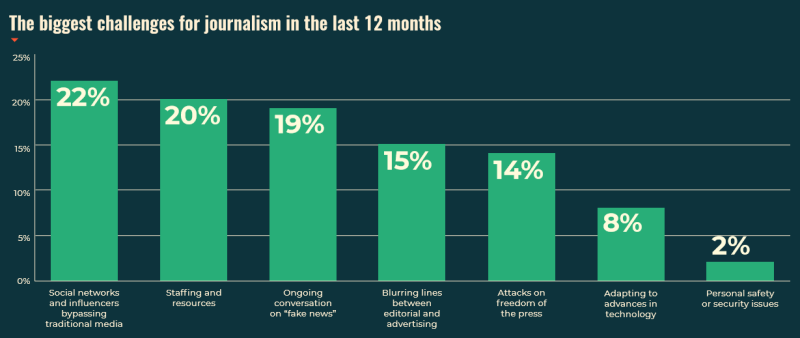
Journalists have rated social networks and the way they allow influencers to bypass traditional media as the biggest challenge for journalism from the past year, according to a new survey.
Almost a quarter (22 per cent) of 1,999 global media professionals surveyed in February for Cision’s annual State of the Media report rated social media as the biggest challenge faced by the industry in 2018.
This was followed closely by challenges posed by reduced staffing and resources, seen as the biggest challenge by 20 per cent of respondents, and the ongoing conversation around “fake news” (19 per cent).
The majority of the 469 UK journalists surveyed (38 per cent) believe social media algorithms will be the technology with the biggest impact on their work throughout 2019, an increase of 10 per cent from the 2018 survey compared with a 4 per cent rise globally.
The changes to Facebook’s news feed algorithm last year to favour “meaningful social interactions” and show fewer posts from news publishers were seen as “deeply significant”, with Archant admitting it had dented its digital audience growth.
Cision chief executive Kevin Akeroyd said: “While fake news is still a concern, it’s not journalism’s top challenge this year. Unfortunately issues around social media and resources lead the list of concerns in the United Kingdom.
“But the news isn’t all bad; we are encouraged to see a continued decrease in perceptions of public distrust in the media.”

Biggest challenges to journalism globally in 2018, according to Cision State of the Media report 2019
The survey showed that journalists’ perception of public trust in the media has improved.
Sixty-three per cent of UK respondents felt the public lost trust in the media in the past year, down from 71 per cent who felt the same in 2018 and 91 per cent in 2017.
Meanwhile, half of those who responded globally thought accuracy was the most important consideration at their organisation, followed by 34 per cent who said revenue was most important.
The survey also revealed an increased reliance on data to decide what stories to focus on. Two-thirds of journalists in the UK said audience metrics like page views and engagement have changed the type of content they publish.
The pressures being put on UK journalists who face smaller newsroom resources were also put into focus, as 27 per cent said their relationships with PRs became more valuable in 2018 (up from 9 per cent in last year’s survey) and 42 per cent said they work on stories no more than a day in advance.
Picture: Pexels
Email pged@pressgazette.co.uk to point out mistakes, provide story tips or send in a letter for publication on our "Letters Page" blog

